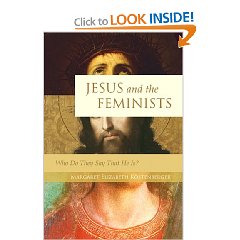 In Jesus and the Feminists, Margaret Elizabeth Köstenberger tackled the issue of feminism’s theological approach to the person of Jesus Christ. She examined the historical development of feminism throughout the last half century. Beginning with radical feminism Köstenberger traced the theological conclusions concerning Christ which feminism has expressed.
In Jesus and the Feminists, Margaret Elizabeth Köstenberger tackled the issue of feminism’s theological approach to the person of Jesus Christ. She examined the historical development of feminism throughout the last half century. Beginning with radical feminism Köstenberger traced the theological conclusions concerning Christ which feminism has expressed.
Köstenberger pointedly evaluated the various theological positions concerning Christ espoused from different feminist writers. She dealt with an overarching, though by no means uniform, hermeneutic that describes the feminist movement. Köstenberger defined the various positions as radical, reformist, new, or evangelical. Each position approached Christ from a different biblical hermeneutic. The radical feminists essentially disregarded the Bible as a whole, thus making their own view of Christ supreme. Reformist feminism viewed Scripture with suspicion and accepted or rejected passages based on their patriarchal or feminist bent. Instead of rejecting large amounts of Scripture as the radical or reformist feminist would do, the new feminist sought to find the answers about Christ and feminism in the biblical text though their evaluation of every text and picture of Christ came through a feminist lens. The evangelical feminists argued that an egalitarian view of women/men relationships, as pictured in Scripture, is God’s intention.
As a female driven to understand the truth, Köstenberger critiques many of her feminist colleagues for their rejection of Scriptural authority in developing their theology of Christ. This book is helpful in its historical overview of feminist theology as well as its prescription of a solidly biblical hermeneutic in examining Christ’s view of and relationship with those of the female gender. Köstenberger would stand solidly on Christ as a perfect male in a clearly biblical egalitarian world.
